Nyhet 2024-05-29
Efter trettio år av parlamentarisk majoritet har det ledande partiet i Sydafrika, African National Congress (ANC), för första gången fått mindre än 50% av rösterna. I söndags rapporterades valresultatet där ANC fick 40% av rösterna, mittenpartiet Democratic Alliance (DA) fick 21% av rösterna, det nybildade uMkhonto we Sizwe (MK) fick 14% av rösterna och det långtgående vänster partiet Economic Freedom Fighters (EFF) fick 9% av rösterna. Nu återstår en 14 dagars förhandlingsperiod innan den sydafrikanska befolkningen vet vilken koalition som kommer styra deras land och vem som kommer gå längst fram i representationen som deras president. Läs vår medarbetare Hope Khozas analys av det politiska läget i Sydafrika och dagens val.
South Africans are getting ready for what is set to be the most closely contested elections in the country’s 30 years of democracy. Wednesday, 29 May will be the seventh time that South Africans of all races, from all walks of life, from all corners of our country, will go to vote for national and provincial government. These general elections could see the ruling party, African National Congress (ANC), fail to secure a majority for the first time in 3 decades. This could bring the biggest political shift since the country became a democracy in 1994. South African president who is also the president and head of the ANC, Cyril Ramaphosa is gunning for his second and final election term.

Opinion polls indicate that the ANC’s share of the vote may fall below 50% for the first time. This is particularly notable because 7 of the main opposition parties have established a coalition to unseat the ANC. While they disagree strongly on policy and are in no way united, the main opposition parties, centrist Democratic Alliance (DA) to the far-left Economic Freedom Fighters (EFF) and the new uMkhonto we Sizwe (MK) Party of former President Jacob Zuma, repeat one theme: that the ANC has failed to live up to its 1994 promise, when it swept to victory under the slogan “A Better Life For All.” The ANC government has also been criticized for the corruption scandals that have plagued it and for not tackling the country’s violent crime challenges. The upcoming elections will take place at a time when the country is facing multiple challenges, including unemployment, electricity deficits, high inflation, poor service delivery, and a high cost of living.
Voters across the country have expressed despondency and determination, in equal measure. Overwhelmed by years of broken promises, some residents have decided to vote beyond past party loyalties. If the ANC fails to gain at least 50 percent, it may be forced into a coalition with smaller opposition parties for the first time in history.
The Independent Election Commission (IEC), which is the electoral body of South Africa has declared the 2024 elections as free, fair, credible and peaceful; despite several challenges it had received. The final results were announced on Sunday evening, overall ANC got 40%, DA got 21%, MK got 14% and EFF got 9% of the votes.
The parties which received the most votes and thus garnered seats in the 400-member National Assembly are as follows:
- African National Congress (ANC) – 159 seats.
- Democratic Alliance (DA) – 87 seats.
- uMkhonto weSizwe party (MK party) – 58 seats.
- Economic Freedom Fighters (EFF) – 39 seats.
- Inkatha Freedom Party (IFP) – 17 seats.
- Patriotic Alliance (PA) – 9 seats.
- Freedom Front Plus (FF Plus) – 6 seats.
- ActionSA – 6 seats.
- African Christian Democratic Party (ACDP) – 3 seats.
- United Democratic Movement (UDM) – 3 seats.
- African Transformation Movement (ATM) – 2 seats.
- Al Jama-ah – 2 seats.
- Build One South Africa (BOSA) – 2 seats.
- National Coloured Congress (NCC) – 2 seats.
- Rise Mzansi – 2 seats
- GOOD Party – 1 seat
- Pan Africanist Congress of Azania (PAC) – 1 seat
- United Africans Transformation (UTM) – 1 seat
As predicted, the ANC has lost its stronghold thus no political party has secured an outright majority. This has opened a 14-day window for coalition talks to take place, after which the National Assembly will be constituted, and the president elected. The multiparty charter that had agreed to a coalition does not have the required seats to govern the country.
Global and local observers are happy and satisfied with the elections and have also declared them to have been free and fair. Observers have called for political leaders to accept the verdict of the elections. Several parties, however, are calling for a recount of the vote, they will have to go the legal route should they choose to pursue this. Despite doing better than expected, MK said it was considering challenging the results in court.
South Africans who exercised their democratic right to vote; along with the rest of the world, will have to wait for 14 days before knowing who the new president will be, and what kind of coalition will govern the country.
Hope Khoza